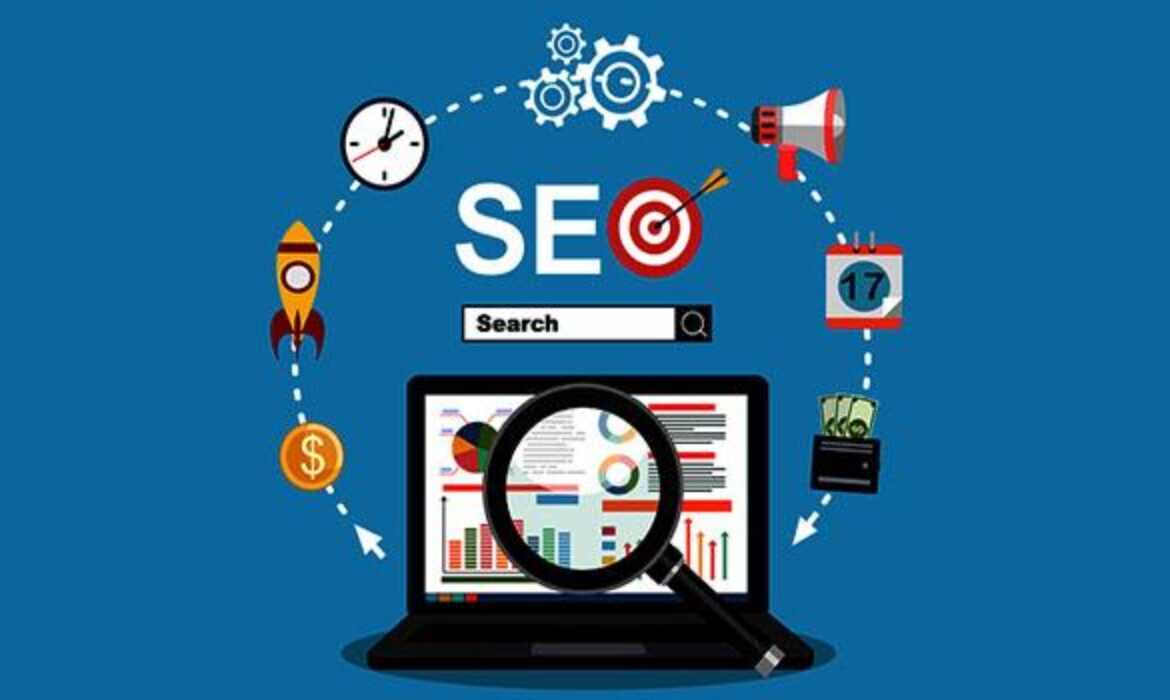Top Benefits of Google Analytics for Boosting Your SEO Campaign
When it comes to SEO in 2023, there might be many online business owners who still view it as a one-time effort. While some completely neglect the importance of content, others turn to employ “marketing hacks” to boost website traffic, such as keyword stuffing or low-quality backlinks. These common mistakes might damage your website’s search engine rankings more than you think.
They might make it more difficult for your customers or clients to locate your website over time. Even if you stray clear from these practices, it’s still extremely beneficial to use Google Analytics to track your SEO efforts. Google Analytics is a very useful tracking tool that assists online businesses of all sizes, from startups to large corporations, to monitor their SEO efforts, keep an eye on their website’s health, and use that data to come up with improved marketing strategies. Before jumping straight in, it’s important to learn the top benefits and features of Google Analytics to understand how it can be useful for your online business.
What Exactly Is Google Analytics?
Google Analytics is a free online tool that provides web analytics to website owners. Web analytics are used by marketers to gather, analyze, and measure website data, such as the number of daily visitors, clicks on a page, average time spent on a page, etc.
These insights can give useful pointers about customer behavior, user engagement, target demographics, etc. For example, you might use this insight to find out where your website users are coming from and which pages they are most interested in.
This data also helps online businesses to make data-driven decisions and improve their SEO strategies to target their user audience better and employ relevant marketing practices on their website. Online businesses may choose between free and paid analytics solutions based on their budget and business requirements.
Simple Steps to Get Started With Google Analytics
Getting started with Google Analytics is more simple and easy than other online tracking tools out there. Users just have to create an account, register their website, and configure it as required. Following registration, they will be sent a tracking code to include on their website so that Google may begin collecting website data from it. Here are the steps to follow to get started with Google Analytics:
- Create a Google Analytics account, register your online business’s website, and include the tracking code into your website.
- Determine your website’s success objectives and set conversion monitoring to track your website’s progress.
- Explore the interface and familiarize yourself with the many features and report types available in Google Analytics, such as audience demographics, behavior flow, audience source, and so on.
- Gather and organize Google Analytics data regularly to enhance your website and SEO marketing strategies.
Although it is simpler to use than other web analytics tools, it’s important to familiarize yourself with its many features to make the most of the tool’s potential.
Top Benefits of Google Analytics for Boosting SEO Campaigns
When used correctly, Google Analytics has the power to improve every aspect of an online business’s marketing approach, from improved customer interaction to boosting its revenue. Here are some benefits of using Google Analytics for boosting SEO campaigns:
1. Helps Understand the Target Audience Better
You already know a thing or two about your target customers as an online business owner, but how well do you know their online behaviors and preferences? Google Analytics can assist you in understanding the requirements and wants of your customers to help you cater to their needs better in terms of products, services, relevant content, and even marketing approaches. Business users can track the following website metrics with Google Analytics:
- Number of daily visits and page views
- Age and gender demographics of website visitors
- Locations and countries of website users
- The devices they use to access your website
- Top channels that drive traffic to your website
- Visitor behavior when interacting with your business’s website
- Best-performing pages
- Pages per session
- Page loading time
- Rates of conversion
- The bounce rates of products and services
2. Observes and Monitors the Performance of Ad Campaigns
One of the best features of Google Analytics is that it’s compatible with Google Ads. This means that business users can monitor their ad campaigns from a single site and track the complete customer cycle.
Combining Google Analytics with your Google Ads accounts also helps you acquire a better understanding of your target audience. You can also use these insights to create more improved PPC campaigns to get the most out of the marketing budget you spent on creating them.
3. Determines and Fixes Lags and Errors on Websites
Since it monitors your business’s website 24/7, you can identify and fix website errors and faults in no time with Google Analytics. For example, if one page on your website is faulty or goes down, you’ll be alerted about it immediately. Being able to be notified about these errors and fixing them quickly can help improve a website’s performance and bring down its bounce rate.
4. Integrates Smoothly With Other Tools
Not being able to integrate easily with other online tools can bring down the efficiency of any web analytics tool. However, with Google Analytics, business users don’t have to worry about that since it allows seamless connectivity with other online tools and apps. It enables business users to manage all of their online accounts in one place. Since every business user may have different requirements from other apps, Google Analytics allows integrations with these tools:
- Google Cloud
- Google Search Console
- Google BigQuery
- Data Studio
- Surveys 360 Remarketing
- Display and Video 360
- Google Ads
- Search Ads 360
- Salesforce Marketing Cloud Integration
- Google Ad Manager
5. Maximizes the Potential of SEO Strategies
Google Analytics is designed to be the perfect tool for SEO. Its many versatile features provide insights that can assist online businesses in optimizing their website so that it ranks better in SERPS. For example, if you noticed your page visits dropping in the last month, you can open Google Analytics to see a report explaining the root cause.
Even if your website is doing well, you may still use it to keep tracking its success to determine the key strategies behind it. Google Analytics also simplifies the process of coming up with strong keywords and popular themes for an online business. This data helps in coming up with more creative and effective ad copies to boost conversion rates.
Power Up Your SEO Strategies With Google Analytics
Google Analytics hasn’t only simplified website analytics reporting, but it may also help you boost your digital marketing and SEO strategies. You’ll be able to develop content that resonates with your audience and drives conversions once you start using its features properly.
There’s no one better that knows the ropes better when it comes to boosting SEO strategies and website performance than SearchBoosters. Get started with us to begin your journey towards higher rankings and online growth.
How to fuel your Online Business using SEO and Content Marketing.
In the digital age we live in now, it’s important for any business to have a strong online profile. No matter how big or small your online business is, you need to use effective methods to keep it going. Search engine optimization (SEO) and content marketing are two important parts that can have a big impact on your online business. When used together in a smart way, these two powerful tools can increase your exposure, bring more people to your website, and, in the end, help you make more money. In this piece, we’ll talk about how SEO and content marketing can help you grow your online business.
Understanding SEO:
Search engine optimization, or SEO, is the process of making changes to your website so that it shows up higher on search engine results pages, or SERPs. When your website shows up on the first page of search engine results, you are more likely to get free traffic and possible customers. To use SEO to feed your online business, think about the following:
1. Keyword Research:
To find out what terms and words your target audience is looking for, start by doing thorough keyword research. Use keyword research tools to find keywords that are important to your business and have a lot of searches but not a lot of competition. Your content development and search engine optimization will be based on these keywords.
2. On-Page Optimization:
With on-page optimization, you tweak different parts of your website to make it more friendly to search engines. This means optimizing headings, URLs, meta tags (title tags and meta descriptions), and the text itself. Make sure your website is set up in a way that makes it easy for search engines to read and understand. Use your keywords in a natural way and in a planned way throughout your writing.
3. Quality Content:
For SEO, it’s important to make high-quality, useful content. Search engines give more weight to websites that give people information they can use. Make articles, blog posts, videos, and other types of content that your target group will find useful. Use your keyword study to guide your content creation and make sure your content meets your audience’s needs and interests.
4. Link building:
Another important part of SEO is building a strong network of backlinks. Backlinks are links on other websites that lead back to yours. Search engines see them as votes of faith that your site is authoritative and trustworthy. Reach out to authoritative websites in your field and see if you can guest post, take part in industry forums, or create content that people will want to share and that will automatically attract backlinks.
Content Marketing:
Content Marketing is all about creating and sharing valuable, relevant, and consistent material to attract and keep your target audience’s attention. By combining SEO and content marketing, you can give your online business a boost. Here are some important things to think about:
1. Make a plan for your content:
Create a content plan that fits your business goals and the people you want to reach. Figure out what kinds of content you will make, like blog posts, videos, info graphics, podcasts, or eBooks, and set a regular plan for publishing them. Your content plan should think about the topics and themes that your audience cares about, as well as the platforms and channels you’ll use to share your content.
2. Address Customers’ Pain Points:
Your content should address the pain points, challenges, and interests of your target group. By giving people answers, insights, and useful information, you establish yourself as an expert in your field and earn their trust. Do study to find out what your audience’s most common questions, problems, and needs are, and then create content that answers those questions and meets those needs.
3. Optimize content for SEO:
As we’ve already talked about, it’s important for SEO to use useful keywords in your content. Find the keywords and phrases that are important to your content and use them in the titles, headings, and body of your content in a smart way. But it’s important to find a good mix and stay away from keyword stuffing, which can hurt your rankings. Focus on making good, interesting content that easily includes keywords in a way that makes sense.
4. Promote your content:
Making great content is only half the fight. To keep your online business going, you need to get the word out about your work well. Create a plan for marketing that includes social media marketing, email newsletters, working with influencers, and distributing information. Use the people you already know and reach out to important influencers or industry leaders who can help your content reach a larger audience. Engage with your followers on social media sites and encourage them to share and join in.
5. Analyze and Refine:
For your SEO and content marketing to work, you need to keep analyzing and making changes. Keep an eye on important measures like website traffic, user engagement, conversions, and bounce rates. Use web analytics tools like Google Analytics to learn more about how people are using your material and website. Use this data to improve your online business by refining your content plan, finding places to improve, and making decisions based on the data.
In conclusion, if you want your online business to grow, you need to use SEO and content marketing to their full potential. By using good SEO methods and writing useful content, you can boost the visibility of your website, get more organic traffic, and grow your online business. Keep up with the latest SEO trends and change your content marketing strategies to meet the needs of your target group as they change. Your online business can do well in the competitive digital world if you use SEO and content marketing well.
Why Small Businesses in NYC Need SEO
In today’s digital landscape, having a strong online presence is vital for the success of any business, regardless of its size. Search Engine Optimization (SEO) plays a crucial role in improving your website’s visibility and driving organic traffic. However, for small businesses with limited resources, investing in SEO services can often seem like a daunting and expensive task. But fear not! In this blog post, we will explore affordable SEO services specifically tailored for small businesses, allowing you to optimize your online presence without draining your budget.
In the bustling metropolis of New York City, where opportunities abound and competition is fierce, small businesses face a unique challenge in establishing their online presence. In this digital age, search engine optimization (SEO) has become an indispensable tool for businesses to rise above the noise and connect with their target audience. However, many small businesses often shy away from SEO due to perceived high costs and limited resources. But fear not, as affordable SEO services can be the game-changer that propels your business to new heights in the concrete jungle of NYC.
Understanding the Importance of SEO for Small Businesses:
Before diving into affordable SEO services, it’s important to grasp why SEO matters for small businesses. With the majority of consumers relying on search engines to find products and services, ranking higher in search results can significantly boost your visibility, credibility, and customer acquisition. By implementing effective SEO strategies, you can reach your target audience, outrank competitors, and ultimately drive more organic traffic to your website.
DIY SEO: Cost-Effective Strategies for Small Businesses:
For small businesses on a tight budget, do-it-yourself (DIY) SEO can be a viable option. This section will explore various cost-effective strategies that small business owners can implement themselves. From conducting keyword research and optimizing website content to improving page load speed and building quality backlinks, we will provide practical tips and tools to enhance your website’s SEO without spending a fortune.
Affordable SEO Service Packages:
While DIY SEO can be effective, outsourcing SEO tasks to professionals can save you time and effort, allowing you to focus on your core business activities. This section will introduce affordable SEO service packages specifically designed for small businesses. These packages typically offer a range of services, including keyword research, on-page optimization, link building, content creation, and monthly performance reporting. We will explore reputable SEO service providers that offer cost-effective options without compromising on quality.
Now, let’s uncover the secrets of affordable SEO services tailored specifically for small businesses in the Big Apple. While it’s true that larger enterprises often invest substantial sums into comprehensive SEO campaigns, there are affordable alternatives that can deliver significant results without breaking the bank.
Click here: Affordable SEO Packages
Focus on Local SEO:
A key advantage for small businesses in NYC is the opportunity to target a specific geographic area. Local SEO techniques ensure that your business appears prominently in local search results, enabling you to reach potential customers right in your neighborhood.
Customized Strategies:
Affordable SEO services understand the unique needs and constraints of small businesses. They develop customized strategies that align with your budget, industry, and target audience, maximizing the impact of your online presence without excessive costs.
Content Optimization:
Engaging and high-quality content lies at the heart of effective SEO. Affordable SEO services can optimize your website’s existing content and create new, keyword-rich content that resonates with your audience and drives organic traffic.
On-Page and Off-Page Optimization:
From optimizing Meta tags, headers, and URLs to building authoritative backlinks, affordable SEO services employ a comprehensive approach to enhance your website’s visibility and authority in search engine rankings.
Performance Tracking and Reporting:
To ensure transparency and accountability, affordable SEO services provide regular performance reports, allowing you to monitor the progress of your SEO campaigns and make data-driven decisions.
Why Local SEO is important for Small Businesses:
Local SEO can be a game changer for small businesses seeking a local audience. This section will investigate the power of local SEO and how it may assist small businesses in increasing their visibility within their chosen geographical area. To maximize local search exposure, we will look at tactics such as enhancing Google My Business listings, gaining online reviews, and using local directories.
Choosing the Best SEO Service Provider:
Selecting the best SEO service provider is crucial to getting the most bang for your dollar. We will give a checklist of factors to consider when comparing different suppliers, such as their competency, expertise, client evaluations, and pricing structures. Furthermore, we will highlight many red flags to avoid falling victim to low-quality or inefficient SEO services.
Conclusion:
While SEO may appear to be a daunting idea, understanding its significance in today’s digital landscape is critical for small businesses. Small businesses may enhance their online presence without breaking the bank by investigating budget SEO services, employing DIY tactics, and using the power of local SEO. Remember that investing in SEO is an investment in your company’s long-term success and growth. So, don’t allow a limited budget to hold you back—embrace low-cost SEO services and watch your online presence skyrocket.






